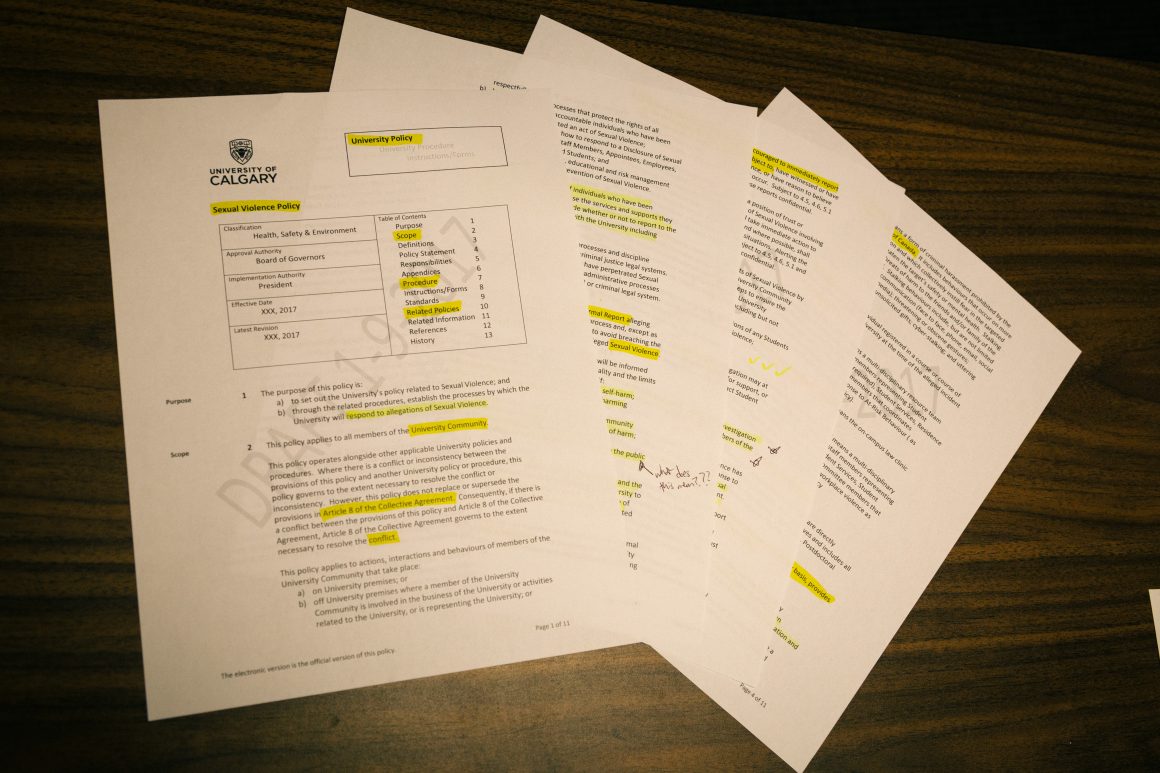
Open consultation important opportunity for feedback on campus sexual violence policy
By Melanie Woods, January 17 2017 —
On Jan. 9, the University of Calgary opened up its sexual violence policy for consultation. The document is intended to provide a framework on campus for reporting and investigating sexual violence cases. The consultation webpage includes links to a draft of the policy, a flow-chart and an online form to provide direct feedback.
You probably think you have better things to do than complete the survey. Policy minutiae isn’t the most thrilling thing in the world, I get it. But this policy hasn’t been updated since 1991 — it’s worth 15 minutes of your time.
A lot of university policies pass behind the closed doors of board meetings and administration without direct feedback from students. But the U of C has been pretty open with the development of this specific document, consulting with groups such as the Women’s Resource Centre and Consent and Sexual Education student club.
University administration will often recruit select student groups to represent a whole and tout their “impressive” student consultation. And while the contributions of those groups can’t be understated, the fact that the university opened this policy up to community consultation is evidence of how serious they are about sexual violence on campus. So take fifteen minutes out of your day, read it, think about it and make the university understand how serious we are about it too.
On the surface, there’s a lot to like about the proposed policy. It explicitly defines sexual violence in a comprehensive and specific way that takes into account physical as well as psychological abuse. The policy also includes entire sections on consent, anonymity and a new position of Sexual Violence Support Advocate, who is an individual specifically trained and designated as the first point of contact for sexual violence cases.
But we must also use this opportunity to point out the document’s shortcomings. There are places where cases of sexual assault could fall through the cracks or the policy could be misinterpreted.
Section 4.23 of the policy states: “A Disclosure is not a Formal Report and will not trigger an investigation unless the University becomes aware of a risk to other members of the University Community.”
But what does that mean? By the policy’s own definitions of “disclosure” and “formal report,” it means an individual could share information about a personal experience with sexual violence to the university and that might not prompt an investigation if that individual didn’t file a formal report. And the document is incredibly vague about the difference between a disclosure and a formal report.
Further, any incident of sexual violence on our campus is a threat to the university community and should be treated as such. Suggesting that it is possible it is not goes against what this policy is trying to improve about our university’s treatment of sexual violence.
Incidents of sexual violence are traumatic and the lengths victims have to go to report their experiences to law enforcement are a well-documented barrier across society. With vague wording, the policy opens a window to claim that a report is simply a disclosure and not a formal report or that there isn’t a “threat” to the university.
This vague language is found throughout the policy, particularly around discussions of reporting and investigations. The intense specificity the policy affords to definitions of sexual assault and consent must be employed throughout the entire document to ensure it is as clear as possible. Reporting sexual violence is not a place to leave loopholes.
When going through the consultation, if the language feels unclear to you — if there’s a point you don’t understand or information you don’t have — demand that it is clarified. If the university is going to drop a vaguely worded policy onto us for consultation, point out where it feels vaguely worded.
It’s important that we engage with this document. Read through it and think critically about it. If you don’t understand something, point it out. Give your feedback and let the U of C know you care about the way sexual violence is handled on our campus. This is our chance to get it right, so let’s get it right.
